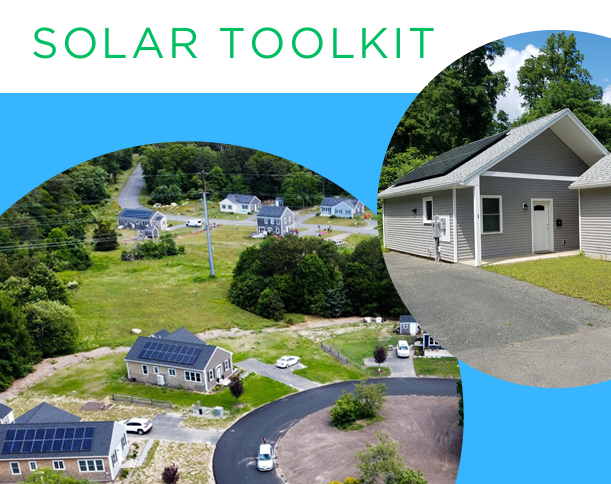
With the aid of a grant from MassCEC’s EmPower Massachusetts program, the non-profit Habitat for Humanity of Greater Boston has created a valuable new resource that will help other Habitat affiliates add solar energy to new homes they construct. This is a great tool for making clean energy more accessible to low- or moderate-income households. The Solar Toolkit provides background on solar photovoltaics (PV) as well as tips on planning for solar installation on residential buildings, options for financing solar PV systems for affordable housing projects located in Massachusetts, and more.
Reducing Barriers to PV Adoption
Habitat Greater Boston knew that most of its Habitat for Humanity affiliates did not feel very knowledgeable about solar, despite having some experience installing PV on their housing projects. As a group, they wanted more comprehensive information about the costs and benefits for their homeowners, and a better understanding of different Massachusetts-specific incentives and financing options for their unique approach to home-building. This information would help them include solar PV in more of their projects.
Habitat Greater Boston turned to MassCEC’s EmPower Massachusetts program for help. EmPower is a grant program that invests in community-led projects to increase access to clean energy and its benefits, particularly in underserved communities. The program is very flexible in that it relies on local leaders to identify the challenges in their communities and develop innovative solutions tailored to their specific needs and opportunities.
MassCEC provided Habitat Greater Boston with a grant to engage the non-profit solar developer Resonant Energy to dig deeply into the barriers facing 14 Habitat affiliates across Massachusetts. Based on questions and concerns raised during their interviews with the affiliates, Resonant then produced a toolkit that covers topics such as
- How solar PV works
- Key considerations when designing and planning for solar PV
- Available incentives
- Leveraging a non-profit’s capabilities to create ownership and financing models that work for low- and moderate-income households
Not just for Habitat affiliates, the toolkit is a valuable resource for other Massachusetts community-based organizations and affordable housing developers interested in adopting residential solar PV.
Follow-Up Work
This project is serving as a catalyst for continued work — Resonant was awarded an EmPower grant to support five of the participating affiliates with technical assistance to identify the best path forward for solar PV on their new construction projects. MassCEC looks forward to seeing the projects progress and sharing updates on the impactful work being done by Habitat and Resonant in Massachusetts.
Those interested in expanding solar access to more households may also want to explore the Massachusetts Solar for All (MASFA) program, which offers additional pathways to make solar energy accessible to low- and moderate-income residents across the Commonwealth.